Key takeaways:
- The relationship between wealth and justice highlights the importance of equitable treatment and opportunities for all, emphasizing the ethical ramifications of wealth accumulation.
- Reparations are a complex issue that requires confronting historical injustices and recognizing the emotional weight of individual stories, prompting discussions about privilege and responsibility in society.
- Reflecting on personal wealth often reveals disparities and the challenges some face; it raises questions about inherited wealth and the broader responsibility to foster equity.
- The future of reparations advocacy depends on collective action, sustained engagement from younger generations, and the importance of coalition building to create impactful change.
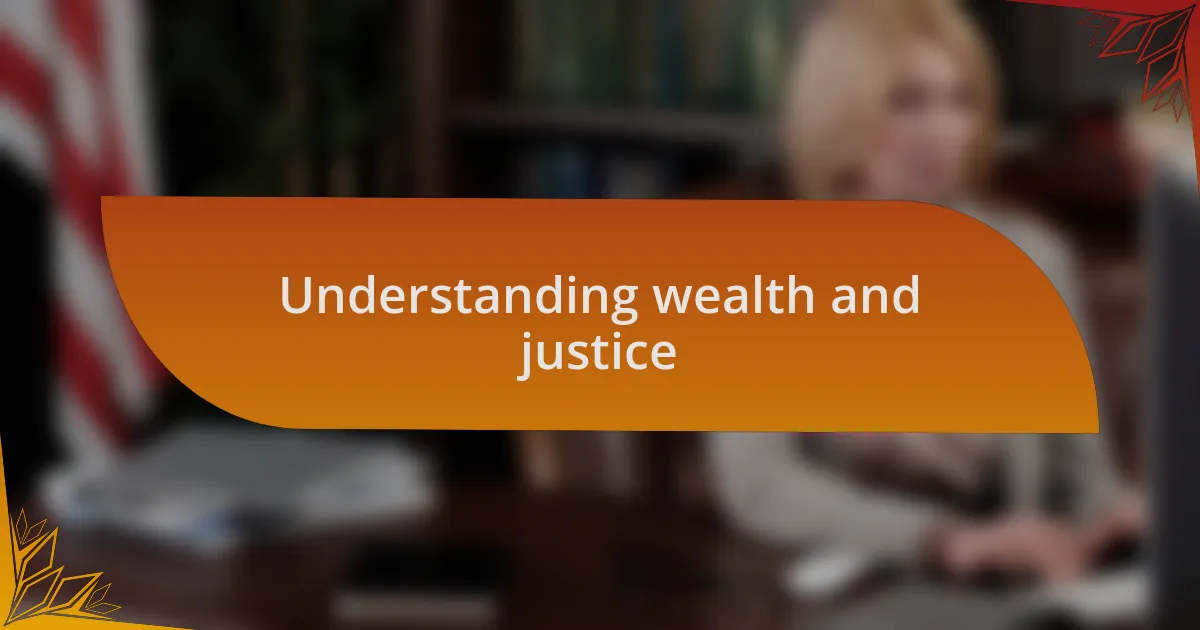
Understanding wealth and justice
Wealth and justice are deeply intertwined concepts that shape our society in profound ways. Reflecting on my own life, I’ve often wondered: can you ever truly feel secure in your wealth if justice is not accessible to everyone? This question doesn’t just linger; it echoes through the experiences of those around me, reminding me that prosperity often exists in a vacuum when accompanied by systemic injustices.
When I think about justice, I recall a time when I volunteered in a community outreach program. The stark disparities between the affluent and the underserved opened my eyes to the harsh realities many face. It made me realize that wealth, while often celebrated, can be a privilege that becomes problematic when it stands in the way of equitable treatment and opportunity for all.
What about the ethical ramifications of wealth accumulation? I often find myself grappling with this issue, recognizing that true justice should offer everyone a fair chance to thrive. This ongoing internal dialogue about fairness and wealth inspires me to engage more deeply in discussions around reparations and equity, pushing me to consider what responsibility we hold towards fostering a more just society.
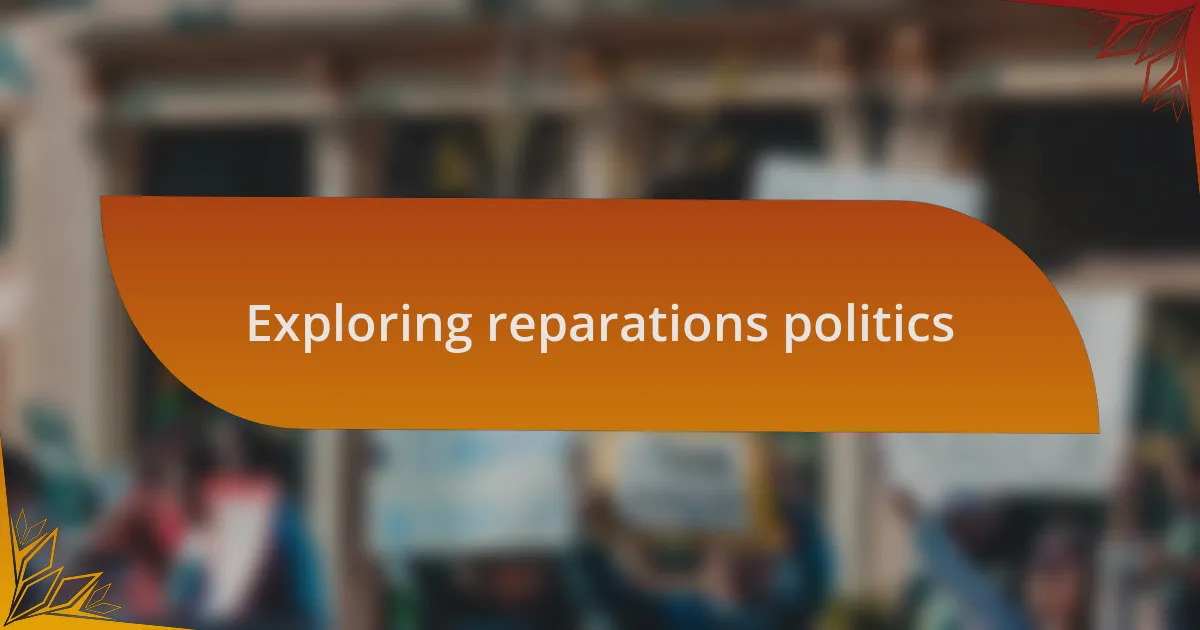
Exploring reparations politics
Reparations politics represent a complex tapestry of moral and economic discussions that reflect our values as a society. I often find myself questioning whether reparations can genuinely heal the wounds of history. When I attended a forum discussing reparations, I listened to powerful accounts from individuals whose families have faced generational injustices. Their stories resonated with me, illuminating the often overlooked emotional weight behind the political dialogue.
Evaluating reparations forces us to confront uncomfortable truths about privilege and responsibility. I recall speaking with a friend whose family benefited from historical injustices, leading me to ask: what does it mean to actively participate in a just society when our past actions continue to shape the present? This kind of reflection lays bare the necessity for open discussions about wealth and honor, prompting us to consider how reparations can be part of a broader solution for societal healing.
Navigating the intricacies of reparations politics is no easy feat. I remember debating with peers who held varying opinions; some viewed reparations as essential, while others questioned their effectiveness. This diversity in perspectives made me realize that exploring reparations requires not just listening, but also an empathetic understanding of each narrative. It encourages a deeper engagement with the histories that shape our collective identity and compels us to confront our role in either perpetuating or dismantling the injustices that bind us.
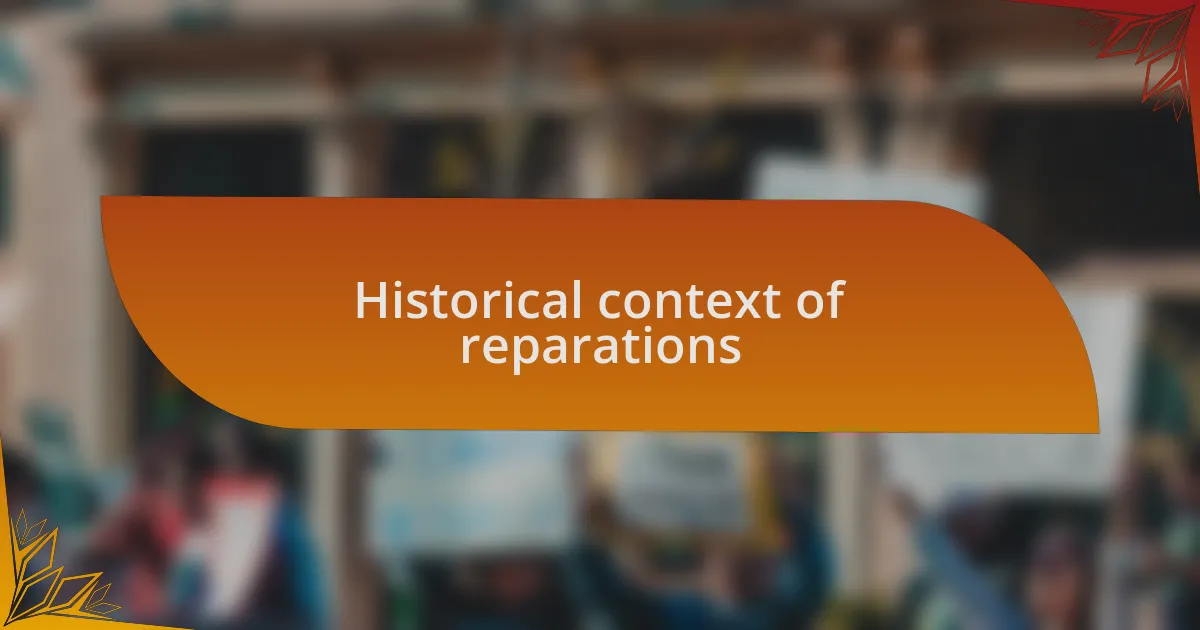
Historical context of reparations
The historical context of reparations stretches back to significant moments like the aftermath of the American Civil War. When the government proposed the promise of “40 acres and a mule” to formerly enslaved people, I can’t help but wonder how different our society would look today had this promise been fulfilled. It’s a sobering reminder of lost opportunities and the profound impact those early decisions had on generational wealth.
Moving forward to the post-World War II era, various countries grappled with reparations to address injustices against marginalized communities. I’ve often reflected on Germany’s reparations to Holocaust survivors. It evokes a sense of accountability that I believe many nations still struggle to embrace. In drawing connections to today’s context, I ask: how can acknowledging historical injustices transform modern conversations about reparations?
In the United States, the Civil Rights Movement reignited discussions around reparations, exposing deep-seated inequalities. During a discussion with a local activist, I found myself grappling with the question of how we reconcile the past with the present; can monetary compensation truly achieve justice, or is it merely a token gesture? This ongoing debate keeps pushing me to reconsider what true reparative justice means in a contemporary context.
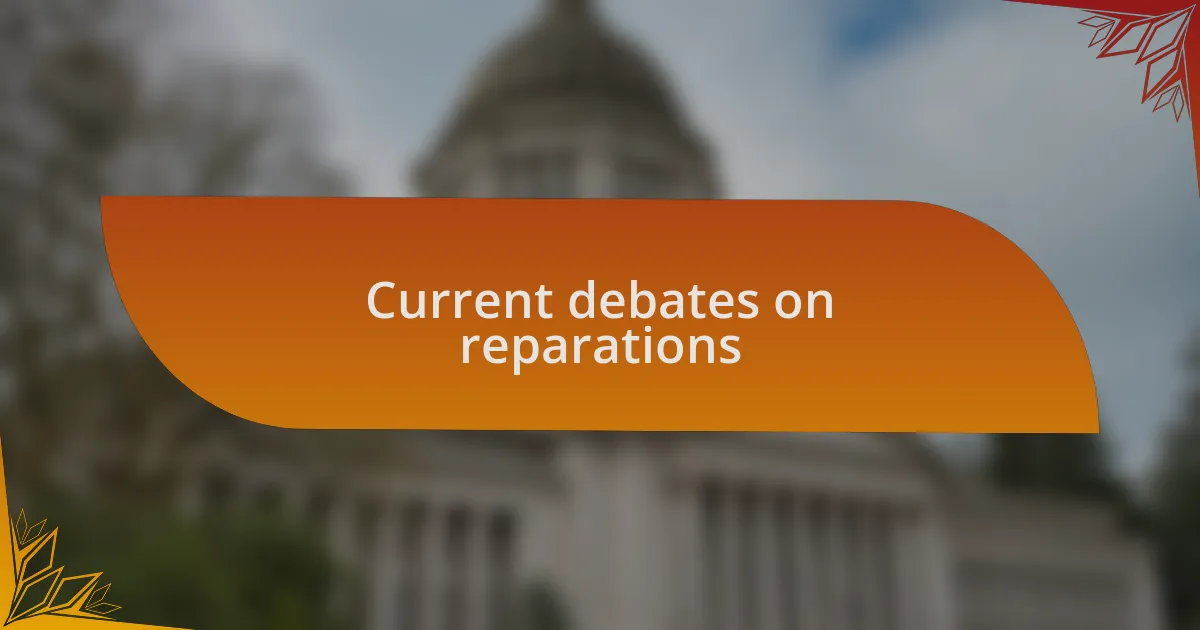
Current debates on reparations
Current debates on reparations are charged with emotions and varying opinions. Recently, I had a conversation with a friend who questioned the fairness of reparations, highlighting how many people today aren’t directly responsible for historical injustices. It made me ponder: can we truly address the deep-rooted scars of history without implementing some form of restitution, or does that idea seem unjust to those who feel they are being penalized for past actions?
Another critical aspect of the current dialogue revolves around the form reparations should take. Should they be financial payments, land restitution, or perhaps educational opportunities? When attending a community meeting, individuals voiced their doubts, expressing that financial compensation alone wouldn’t heal the wounds of the past. This reflection brings me back to a compelling query: is it possible for a true reconciliation to occur without a holistic approach that includes community support and acknowledgment of suffering?
As the discussions evolve, they often unveil a deeper question about national identity and responsibility. I recall a particularly emotional exchange during a panel discussion, where a descendant of enslaved individuals shared their family’s struggles due to systemic inequities. Their story resonated with me, pushing me to contemplate how reparations could serve not only as a form of compensation but also as a step towards societal healing. How can we foster a collective understanding of these historical injustices to promote a future that acknowledges both pain and potential redemption?
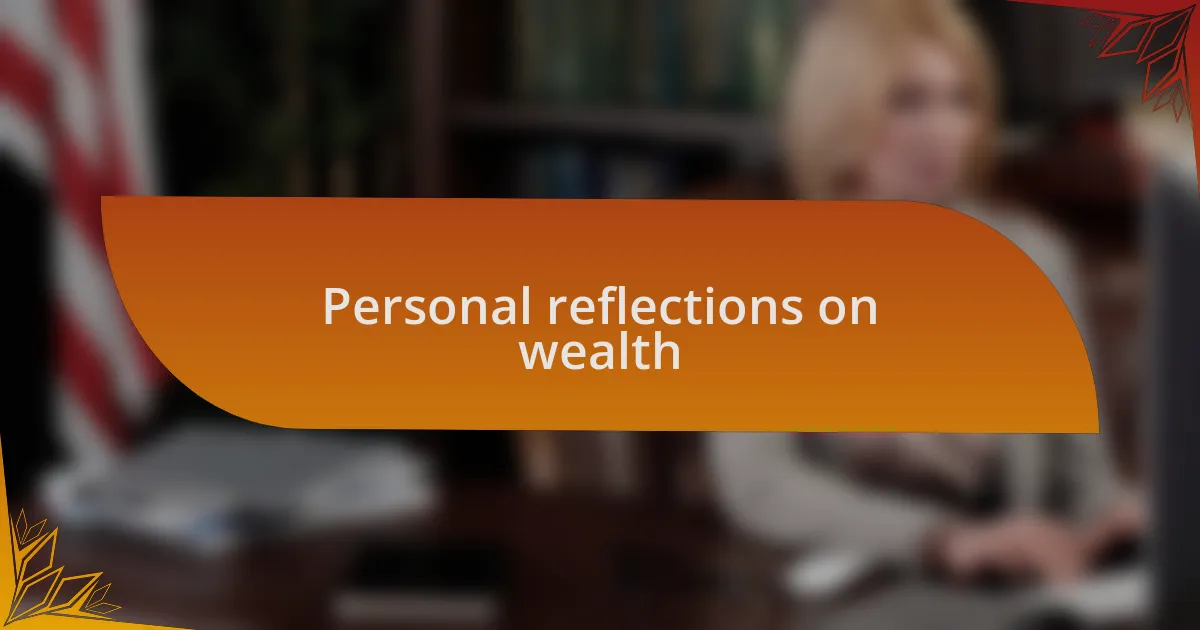
Personal reflections on wealth
Reflecting on wealth, I’ve often wondered about its true meaning and implications. Growing up, I saw how money could transform lives but also create divides. I remember the awe I felt visiting a friend’s home, filled with luxury while my own home was modest. It sparked a question in my mind: does wealth equate to happiness or simply amplify existing inequalities?
In my adult life, I’ve had the privilege to travel to various communities, witnessing the stark contrast in wealth distribution. During a trip to a rural area, I met a woman who ran a small market. Her hard work provided for her family, yet she lived under constant stress, barely making ends meet. This experience deepened my understanding of how wealth can often seem like a distant dream for many, making me question the fairness of a system that allows such disparity to exist.
I also find myself wrestling with the concept of inherited wealth. Watching friends benefit from family legacies while others struggle silently has ignited a sense of unease in me. How is it that some are born into comfort while others start life with burdens? This stark reality forces me to consider our responsibilities toward each other in fostering equity. Is wealth merely a privilege, or should it be a tool for building a more just society? These reflections constantly shape my views on the intersections of wealth and justice in our world today.
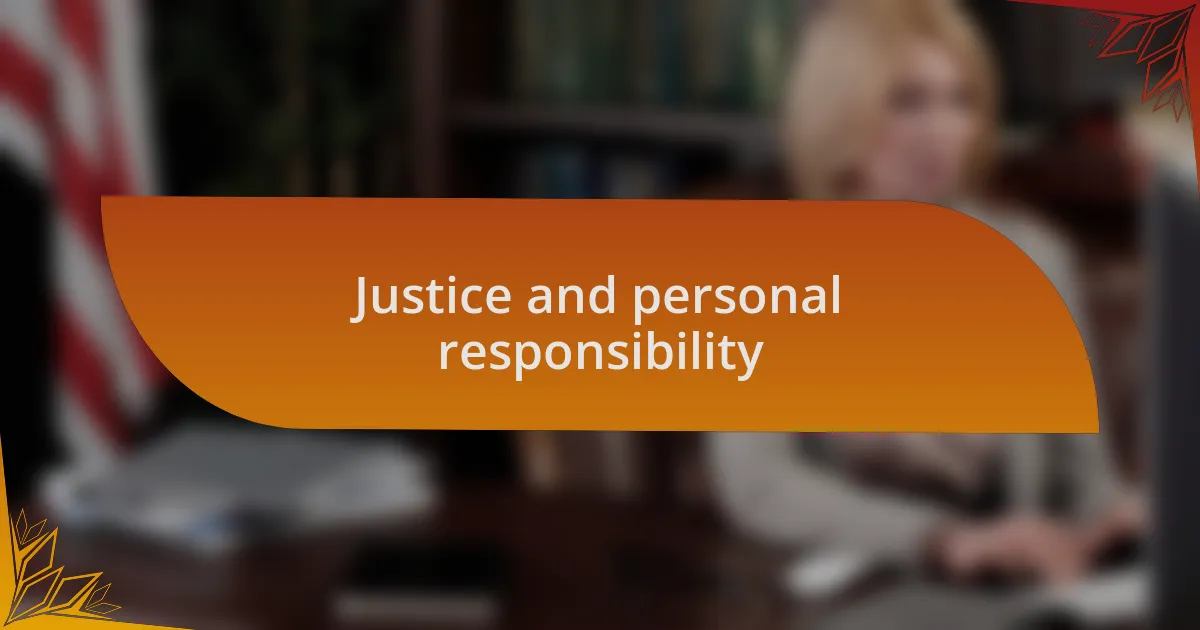
Justice and personal responsibility
Understanding justice within the context of personal responsibility is both profound and multifaceted. I often think about how our choices shape the world around us. For instance, when I volunteered at a community center, I witnessed individuals taking initiative to uplift their circumstances, but not without challenges. It left me pondering: how much of our societal structure relies on personal action versus systemic barriers?
There’s a weighty sense of accountability that accompanies wealth. I recall a time when I inherited a modest sum; instead of simply enjoying it, I felt compelled to invest that money in local projects aimed at empowerment. This decision brought home the truth that justice isn’t just about what we receive, but also about what we give back. I can’t help but ask – how can we each contribute to a more equitable landscape?
Moreover, in conversations with friends, we’ve often debated the role of privilege. One friend shared her experience of mentoring a young entrepreneur from an underserved community. Her words resonated with me: “It’s not just about reaching success; it’s about ensuring others have that chance too.” I believe this underscores a fundamental truth: with wealth comes the responsibility to advocate for those whose voices often go unheard. In exploring justice, we must confront our role in fostering equity and understanding that our actions can either amplify or dismantle injustice.
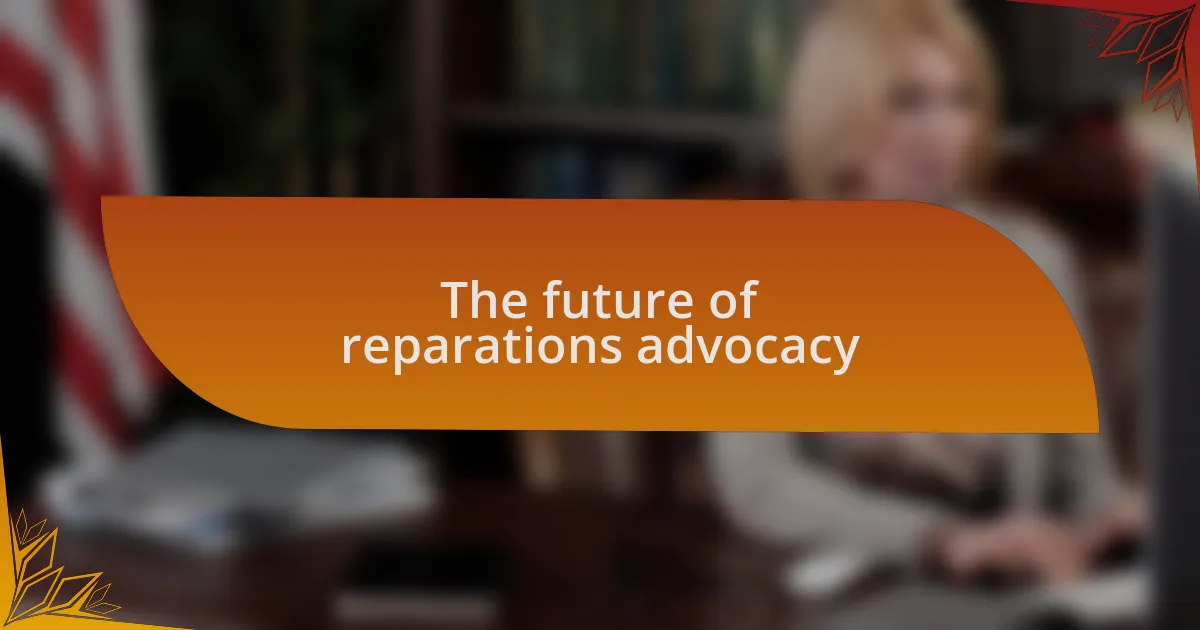
The future of reparations advocacy
The future of reparations advocacy hinges on our ability to shift the narrative from mere acknowledgment of historical injustices to actionable strategies for repair. I recently attended a community forum where passionate voices articulated the need for tangible reparations; their fervor inspired me. Isn’t it fascinating how individual stories can transform a broader movement? Each testimony is a thread in the fabric of advocacy, weaving together personal stakes with collective responsibility.
As I reflect on this evolution, I think about the importance of sustained engagement across generations. Working with youth in activism has shown me the potential of nurturing a new wave of advocates. I remember a young participant sharing her dreams of policy reform, which reminded me that fostering this awareness instills hope in an often disillusioned society. If these young advocates remain engaged, what might the future look like in terms of reparative policies ushered in by a generation that understands their responsibility toward justice?
Looking ahead, unity among various advocacy groups will be crucial. I’ve seen firsthand how coalition building can amplify our voices, whether through shared resources or united campaigns. When these groups come together, they create a powerful narrative that lawmakers can’t ignore. Why is it that collective action often feels more urgent than individual efforts? I believe it’s because we stand stronger together, and with a cohesive strategy, the vision for reparations can transition from theory into impactful reality.